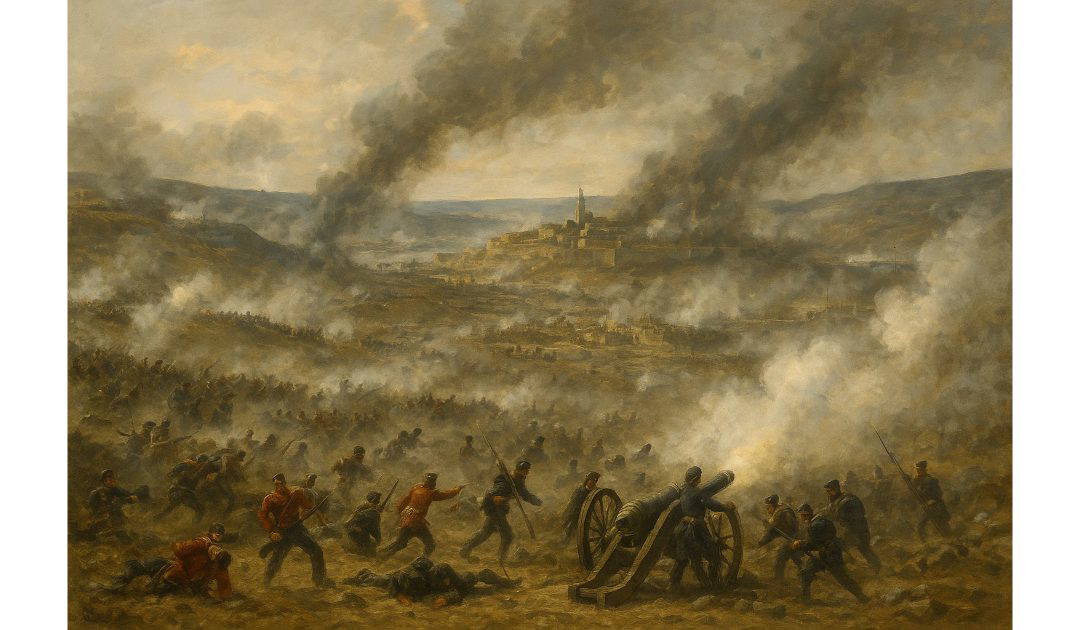Wikipedia tells me that on the 4th of October, 1853, the Ottoman Empire declared war on Russia, thereby starting the Crimean War. It seems topical as it involves both Palestine and Russia. The war primarily pitted the Russian Empire against an alliance comprising the Ottoman Empire, Britain, France, and the Kingdom of Sardinia. Its origins lay in complex geopolitical tensions, religious disputes, and the declining influence of the Ottoman Empire.
Origins and Causes
The immediate cause of the Crimean War was a dispute over the rights of Christian minorities in the Holy Land, then part of the Ottoman Empire. France championed the cause of Catholic Christians, while Russia purported to protect Orthodox Christians. However, beneath these religious pretensions lay Russia’s strategic ambition to expand its influence in the Balkans and gain control over the Dardanelles and Bosporus straits, crucial maritime routes connecting the Black Sea to the Mediterranean.
Russia’s aggressive moves, including its occupation of the Danubian Principalities (modern-day Romania), provoked Ottoman resistance. In October 1853, the Ottoman Empire declared war on Russia, marking the formal start of hostilities. Britain and France, alarmed by Russia’s expansionist aims and determined to maintain the balance of power in Europe, entered the war in March 1854. The Kingdom of Sardinia joined later, seeking to bolster its position in Italian unification efforts.
Major Battles and Campaigns
The most notable military operations occurred on the Crimean Peninsula, where Allied forces aimed to capture the strategic Russian naval base at Sevastopol. The war featured several key battles, including the Battle of Alma (September 1854), where Anglo-French forces achieved a significant victory, and the infamous Charge of the Light Brigade during the Battle of Balaclava (October 1854), epitomising both the bravery and the tragic mismanagement characteristic of the war.
The Siege of Sevastopol (October 1854 – September 1855) was the war’s pivotal campaign. It involved protracted trench warfare, heavy artillery bombardments, and harsh conditions for soldiers on both sides. The eventual fall of Sevastopol marked a turning point, leading to the erosion of Russian resolve and paving the way for peace negotiations.
Technological and Medical Innovations
The Crimean War is often considered one of the first “modern” wars due to the use of new technologies and tactics. The widespread deployment of railways and telegraphs revolutionised logistics and communication. The introduction of rifled muskets and explosive artillery shells increased battlefield lethality, rendering traditional linear tactics obsolete.
The war also highlighted the dire state of military medical care. Florence Nightingale‘s pioneering efforts in organising nursing services and improving sanitary conditions significantly reduced mortality rates among wounded soldiers. Her work laid the foundation for modern nursing and public health reforms in military and civilian contexts.
Diplomacy and the Treaty of Paris
By early 1856, Russia, weakened by military defeats, internal dissent, and economic strain, sought peace. The Treaty of Paris, signed in March 1856, concluded the war. Its key provisions included the neutralisation of the Black Sea (prohibiting military presence), the return of occupied territories, and guarantees of Ottoman territorial integrity.
The treaty represented a diplomatic triumph for the Allies, particularly Britain and France, as it curtailed Russian ambitions in the region. However, it also sowed the seeds of future conflicts by leaving many underlying tensions unresolved. The decline of the Ottoman Empire continued, and the balance of power in Europe remained precarious.
Legacy and Impact
The Crimean War had profound and lasting effects. It exposed the inefficiencies and outdated practices of European militaries, prompting widespread reforms. In Britain, the war led to military restructuring, improvements in medical services, and the establishment of merit-based promotions.
The conflict also had significant socio-political repercussions. The war’s extensive media coverage, facilitated by war correspondents and photographers, brought the realities of battle into the public consciousness as never before. This new level of transparency influenced public opinion and government accountability in democratic societies.
For Russia, the defeat was a catalyst for major internal reforms. Tsar Alexander II initiated the emancipation of the serfs in 1861, recognising the need to modernise the empire’s social and economic structures to compete with Western powers.
In the broader context of European history, the Crimean War marked the decline of the Concert of Europe, the diplomatic framework established after the Napoleonic Wars to maintain peace. The breakdown of this system contributed to the rise of nationalism and set the stage for subsequent conflicts, including the unification of Germany and Italy and, ultimately, the First World War.
In conclusion, the Crimean War was more than a clash over territorial ambitions or religious disputes; it was a crucible of change that reshaped military practices, influenced international relations, and left an indelible mark on the history of Europe and the world.

